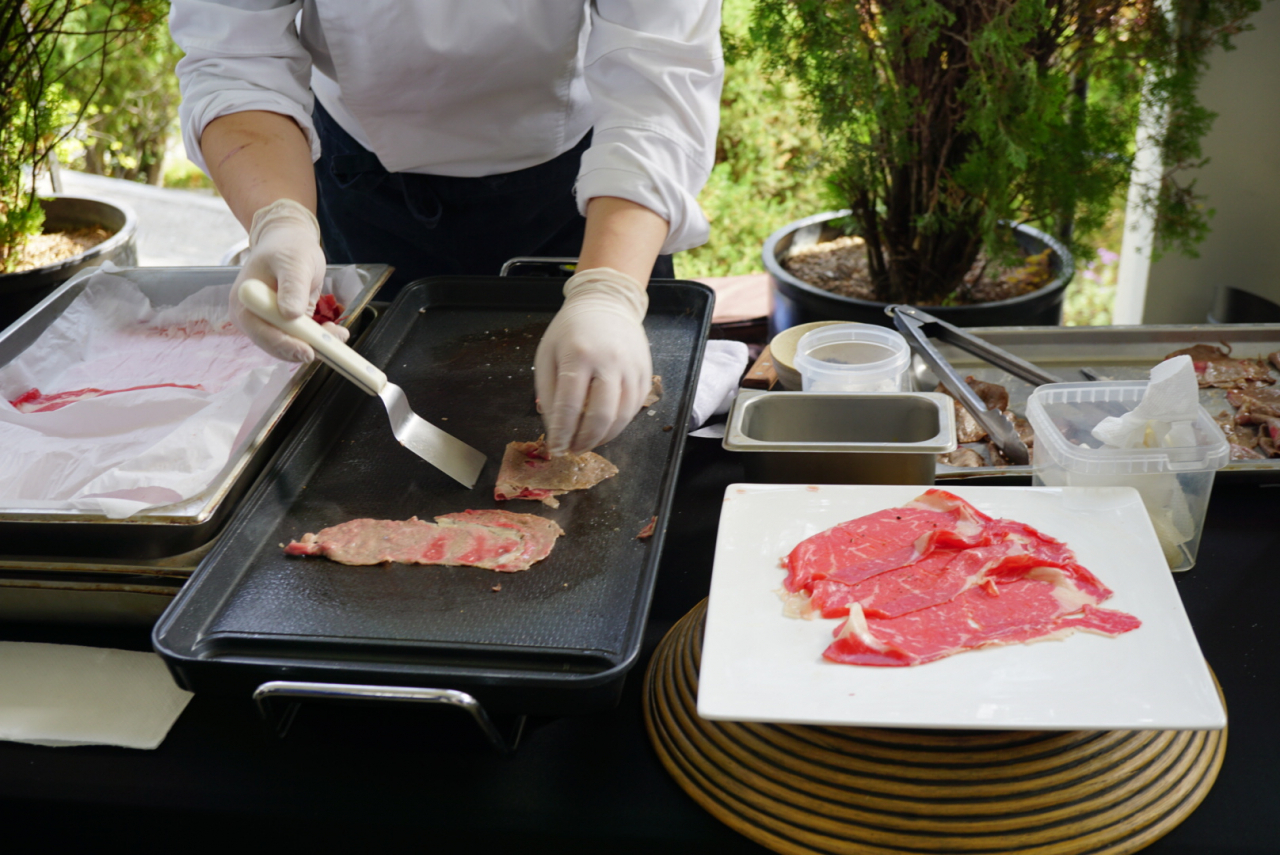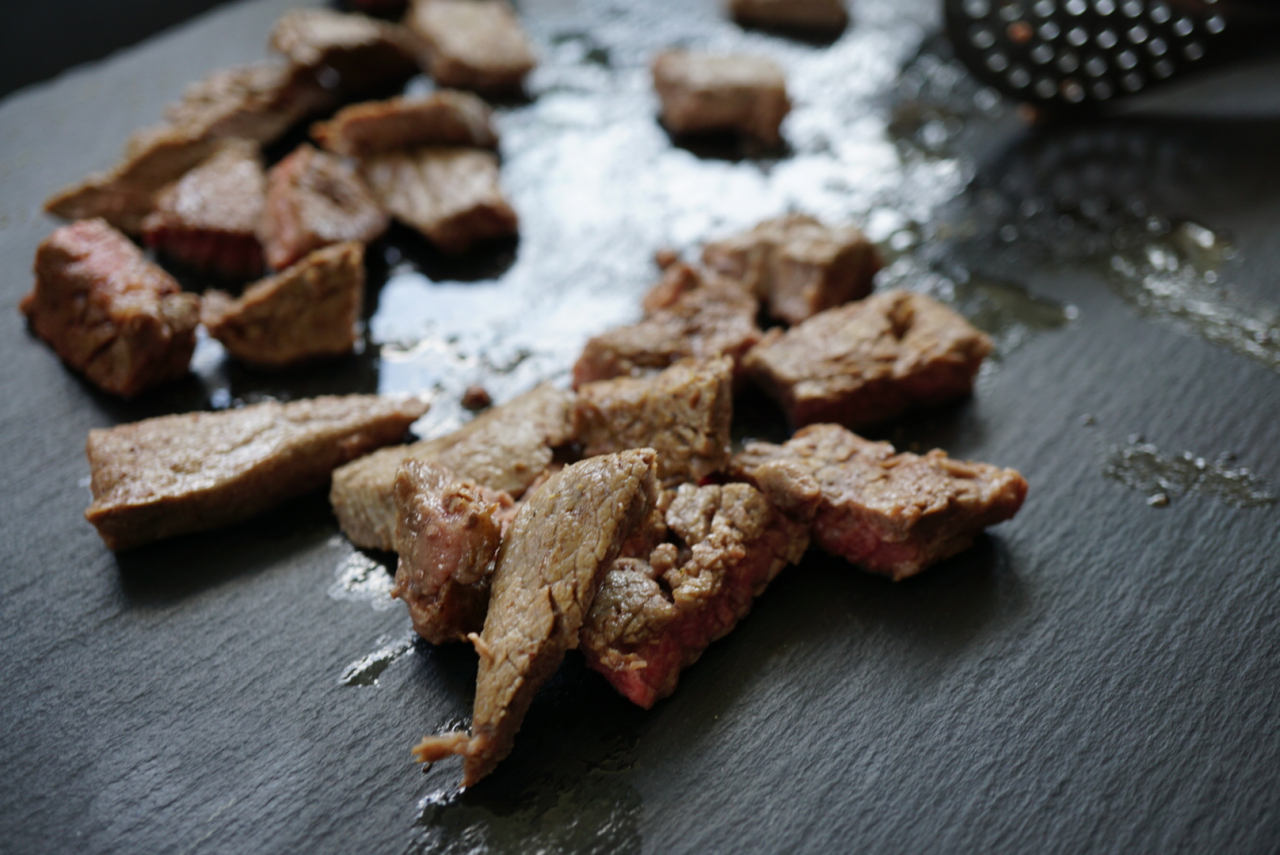 |
Philippe Bertoux, French Ambassador to Korea, prepares a dish that incorporates French beef during an event held to mark the the resumption of French beef import to Korea at the French embassy in Seoul on Monday. (Kim Da-sol/The Korea Herald) |
The import of French beef to Korea resumed for the first time in 24 years on Monday, with the French embassy in Korea and French experts touting it as a good opportunity for Koreans to enjoy diverse and quality meat produced in a sustainable way.
Of the 22 kinds of beef produced across France, the country’s most representative and common Charolais beef is to be sold in Korea, both frozen and refrigerated.
France, the largest producer of beef among EU countries with 17 million heads of cattle as of 2022, of which 10 million are for meat, halted exporting beef to Korea in 2000 due to an outbreak of mad cow disease or Bovine spongiform encephalopathy. Late last year, the Korean assembly agreed on the legal prerequisite for the import hygiene of French and Irish beef.
While the process for French beef import began in June, the detailed sanitary certification took almost six months to complete, according to Claudine Girardo, an agricultural counselor for sanitary and phytosanitary issues for South Korea and Japan at the French embassy in Japan.
“France remains the leading beef meat producer in the EU, producing 21 percent of beef meat in the EU. Under natural and safe production methods, no hormones and no antibiotics are used to promote the growth of cattle. Also, we had food safety authorities from Korea audit the French slaughterhouses’ sanitary condition on a regular basis,” Girardo said during an event held to celebrate the resumption of French beef import to Korea at the French embassy building in Seoul on Monday.
 |
Chef cooks with thinly sliced frozen French beef during the event held to celebrate the resumption of French beef import to Korea at the French embassy in Seoul on Monday. (Kim Da-sol/The Korea Herald) |
 |
French beef tenderloin steak (Kim Da-sol/The Korea Herald) |
French Ambassador to Korea Philippe Bertoux told reporters that French beef imports mean more than reopening the logistics.
“After a little over one year of starting my post here as an ambassador, I learned that Korea and France share many things in common — one of them is that both countries love to enjoy grilled beef and spend good time over good food. Today, we’re very excited to have French beef back here in Korea,” he said.
In a market where US, Australian beef and Japanese Wagyu are the familiar imported beef, how will French beef fare? Market data showed that in the last year, 90 percent of some 450,000 metric tons of beef imported to Korea were from the US and Australia.
Maxence Bigard, President of the Foreign Trade Commission at Interbev, an association for international livestock and meat in France, said it is hard to compare French beef with other kinds. Bigard is also the chair of Groupe Bigard, a 50-year-old French meat processing company that owns half of all slaughterhouses in France.
“To be honest, it’s really hard to tell that French beef has competitiveness in terms of price. But one thing I can say is that French meat exporters don’t stack beef at their storage. They offer meat based on the needs of the customers,” Bigard told reporters, adding that it will also appeal to local buyers by offering a quality variety, such as the intestine.
He also explained some of the characteristics of French beef: a wide variety of flavors, a tender, juicy texture and long-lasting flavor, as well as finely marbled, lean meat with less fat.
“I know a lot of French luxury brands are well-known in Korea, but if you were to say one luxury brand that hasn’t landed here yet, I would say it’s the French beef,” he added.







![[Today’s K-pop] Blackpink’s Jennie, Lisa invited to Coachella as solo acts](http://res.heraldm.com/phpwas/restmb_idxmake.php?idx=644&simg=/content/image/2024/11/21/20241121050099_0.jpg)